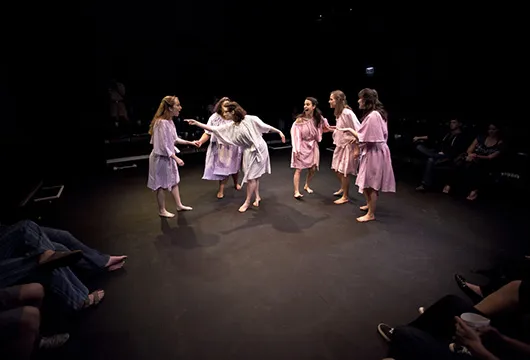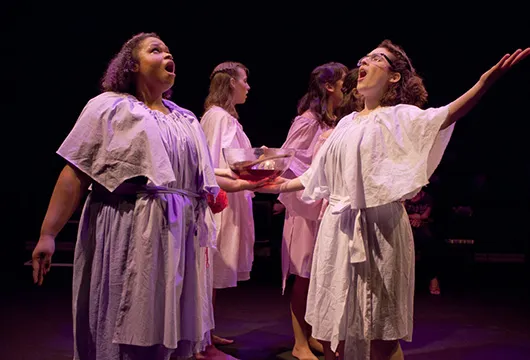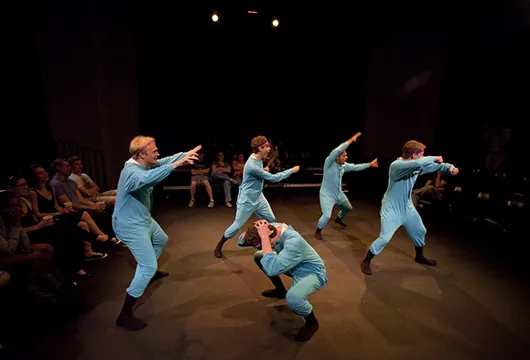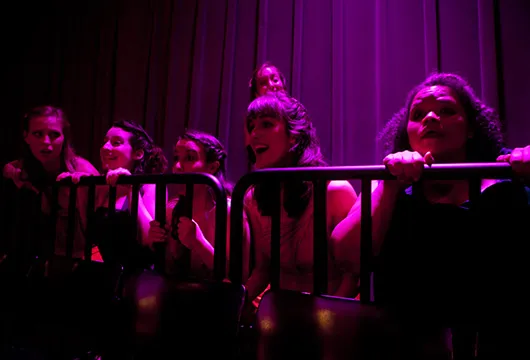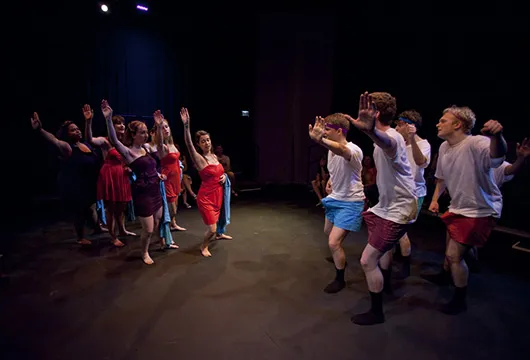LYSISTRATA
Honors Directing Thesis
The Department of Theater presented Aristophanes' Lysistrata on Friday, April 29th at 6PM and 10PM and on Saturday, April 30th at 7PM in the Frear Ensemble Theater. Directed by Eva Amessé '11 with Lori Barkin '12 (Lysistrata),Vianca Masucci '13 (Kalonike), Sara Lipshutz '11 (Myrrhine), Anna Ramos '13 (Lampito), Elliana Bisgaard-Church '13 (Nikodike), Erica Evans '11 (Stratyllis), Chris Klaniecki '10 (Koryphaios), Nemo Swift '11 (Commissioner), Nolan Gear '12 (Kinesias), Peter Liebenson '11 (Philurgos/Spartan Herald), and Gerardo Limón '14 (Strymodoros/Spartan Ambassador) performing Dudley Fitts' adaptation of Aristophanes' classic anti-war play about the battle of the sexes and a test of non-violent civil disobedience. This famous Greek comedy tells the story of the women from opposing states that spend years suffering in silence, while their sons and husbands are off fighting a war with no end in sight. The women decide to put their differences aside in an effort to get their husbands to lay down their swords. They employ the only tactic that will get the men's attention: a sex strike and an occupation of the Acropolis. Lighting design by Jacob Gilbert '12 (Haverford College) and costume design by Rachel Branker '12 with Hannah Gotwals '12, stage manager. The faculty advisor for the project was Prof. Allen Kuharski, chair of the Department of Theater and Stephen Lang Professor of the Performing Arts. Poster and program images by Kat Clark '12.
This production of Aristophanes' bawdy political comedy incorporates the contemporary Roy Hart vocal technique for actors to breathe new life into the choral lyrics that were all originally danced and sung, but in a musical style that is now lost. Guest Artist Adrienne Mackey '04, a Philadelphia-based director who creates original work using both Roy Hart voice and classical opera training, led the cast through a semester-long series of voice workshops. Adrienne explains the Roy Hart vocal technique as "modern dance for the voice." The Roy Hart vocal technique seemed like a fitting point of departure for this play because it emphasizes the power of the voice to express ideas that cannot be said in words. During a monologue Lysistrata herself says, "All along, being proper women, we used to suffer in silence no matter what you men did, because you wouldn't let us make a sound." The women in this play are speaking out for the first time and discovering that their voices can and should be heard. The Roy Hart vocal technique helped us discover how to use our voices as more than just vehicles for the text. By identifying moments in the play when Aristophanes' text seems too narrow and supplementing them with soundscapes, we developed a musical vocabulary that added depth to the story and made it our own.
Working from the Hart philosophy that all sounds are meaningful modes of expression, Mackey helped the cast explore timbres and colors in their voice outside of their traditional performance range. With this wider palate of character vocalizations the group then tackled a series of improvisations aimed at building the group's abilities as "soundscape" artists. The group practiced musical improv skills (a la jazz and other forms of on-the-spot composition) to create musical backdrops for scenes that included both melodic and dissonant qualities. A memorable workshop moment was when a student overheard one of our improvisations and responded excitedly, "Wow, are you making that up as your go along?" The ensemble was thrilled to have someone react so honestly to the musical vocabulary we were developing during the workshop process. This moment proved how important it is to really listen to each other and prioritize the collective voice, mirroring the journey of Lysistrata's female chorus towards empowerment.
Lysistrata is quite unique in terms of the composition of the two choruses. Each chorus does not have one uniform voice, rather it is composed of individuals. Incorporating my Movement Theatre training to help the actors develop unique clown-like characters became another priority for this production. The cast had a clown workshop with Quinn Bauriedel '94 to flesh out the details and eccentricities of the archetypal characters that Aristophanes presents. --Program Notes, Eva Amessé '11 (April 2011)
